Czterdzieści dni po izraelskim nalocie na Damaszek 1 kwietnia 2024 r., w którym zginęło siedmiu wysokich rangą funkcjonariuszy Siły Kuds IRGC, zastępca dowódcy operacyjnego Siły Kuds, gen. Mohsen Chizari, udzielił wywiadu agencji informacyjnej Tasnim stowarzyszonej z IRGC. W wywiadzie z 12 maja 2024 r. omówił rolę i osobowość Mohammada Hadi Hadż Rahimiego, „doradcy wojskowego” Siły Kuds, który zginął w ataku, wraz ze swoim dowódcą, gen. Mohammadem Rezą Zahedim.
Hadż Rahimi rozpoczął karierę w 1981 roku jako instruktor w bazie Imama Hosseina IRGC. Dowodził jedną z najważniejszych dywizji Siły Kuds, jednostką Imama Alego, która została przeszkolona do skomplikowanych operacji wojskowych na arenach wojennych poza granicami Iranu oraz do szkolenia i uzbrajania bojówek wspieranych przez Iran. Hadż Rahimi odegrał znaczącą rolę w przygotowaniu i szkoleniu bojowników frontu ruchu oporu. Po śmierci na zawał serca w 2021 r. zastępcy dowódcy Siły Kuds IRGC, gen. Mohammada Hosseina-Zadeha Hedżaziego, który był odpowiedzialny za całość działań w Libanie, na jego miejsce wyznaczony został Rahimi, jako zastępca dowódcy Siły Kuds ds. koordynacji i służył jako zastępca Zahediego, który był dowódcą Siły Kuds w Syrii i Libanie.
Generał Chizari, który blisko współpracował z Rahimim, powiedział w wywiadzie z 12 maja będącym częścią serii zatytułowanej „Dowódca bez granic”, że „doradca” Rahimi był „człowiekiem dżihadu”, który wraz z innymi irańskimi funkcjonariuszami szkolił siły zbrojne frontu oporu w Iranie i poza nim. Podkreślił: „Grupy działające w Jemenie [tj. Huti] i w innych miejscach są wynikiem pracy ludzi takich jak Hadż Rahimi”.
Chociaż oficjele irańscy powtarzają, że organizacje osi oporu działają niezależnie i nie przyjmują rozkazów Iranu, Chizari podkreślił, że irański najwyższy przywódca Ali Chamenei jest „dowódcą osi oporu” i że „tylko on jest przewodnikiem, przywódcą i dowódcą osi oporu”. Chizari pochwalił się również, że szkolenie, za które odpowiadał Hadż Rahimi, wraz z działalnością innych oficerów Siły Kuds i IRGC umożliwiły operację Potop Al-Aksa – nazwa osi oporu nadana atakowi Hamasu z 7 października 2023 r. i masakrom w południowej części Izraela, w których zginęło ponad 1200 Izraelczyków, a około 240 wzięto jako zakładników. Powiedział, że pod dowództwem Chameneiego irańscy dowódcy osi oporu, w tym Hadż Rahimi, z powodzeniem „przesunęli oś oporu w określone miejsce, czego wynikiem była operacja Potop Al-Aksa … [To] był wynik wieloletnich szkoleń i wsparcia sił dżihadu”.
Nie jest to pierwszy raz, kiedy czołowy urzędnik irański przyznał rolę, jaką odegrali dowódcy Siły Kuds IRGC, którzy zginęli w ataku w Damaszku, w zrealizowaniu ataków z 7 października (zob. także specjalny komunikat MEMRI nr 11264, Close Associate Of Iranian Supreme Leader Khamenei: The IRGC Qods Force Commander For Syria And Lebanon Who Was Killed In Damascus Was Involved In Planning And Execution Of October 7 Hamas Attack, 9 kwietnia 2024 r.)
W wywiadzie Chizari powiedział również, że opór rozprzestrzenił się już na cały świat, nawet do krajów nieislamskich, co jest w istocie „eksportem rewolucji” i umożliwia „niezłomne przeciwstawienie się supermocarstwom”. Skrytykował także „obłudny” Egipt i Arabię Saudyjską, stwierdzając, że udają, że wspierają Palestyńczyków, podczas gdy w rzeczywistości to irańscy szyici pomagają im na polu bitwy.
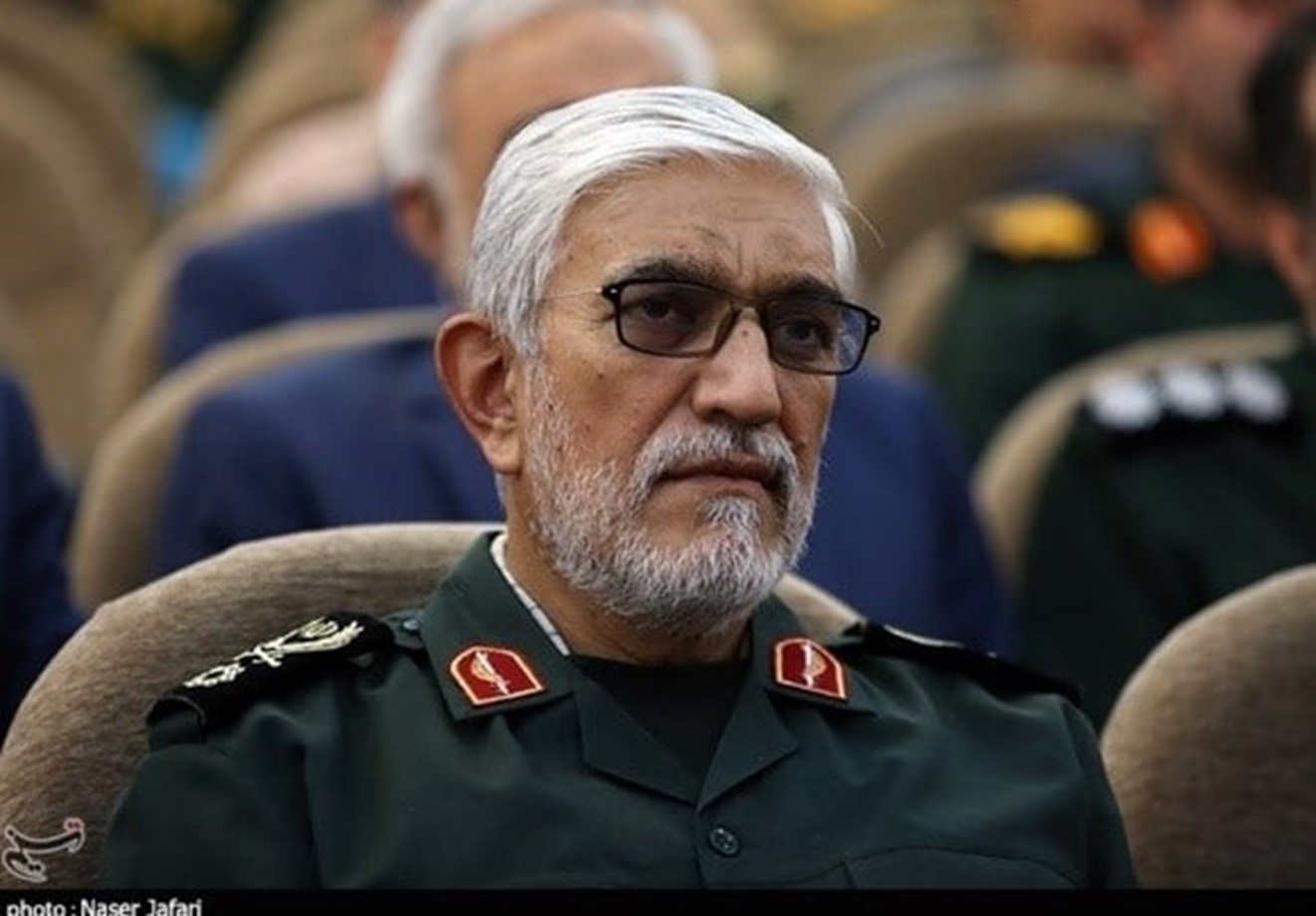
[Ciąg dalszy tekstu – fragmenty wywiadu zastępcy dowódcy operacyjnego Siły Kuds IRGC, gen. Mohsena Chizariego, z 12 maja 2024 r. dla powiązanej z IRGC agencji informacyjnej Tasnim – nie jest spolszczony]
„Hajj Rahimi Would Sent Teams Out Of Iran In Order To Train The Resistance Forces, While At The Same Time He Hosted And Trained Foreign Forces In Iran”
Tasnim News Agency: „How far back does your friendship with the martyr Hajj Rahimi go, and where did you first meet him?”
Gen. Chizari: „During the Iran-Iraq War [1980-1988], the martyr Rahimi served in the 10th Division, and I served in the 27th Division. I met him in the general sense, until he arrived at Qods Force and replaced me at this organization’s academy.”
Tasnim News Agency: „You were the commander and he was your deputy?”
Gen. Chizari: „Correct, I was [a commander] at the academy, and he was [my] deputy for a year, a year and half, and then he traveled to the mission region – Lebanon. During this time, we had a working relationship with him, and based on the interactions [between us] in the mission he mostly advanced the matter of training. After he returned [to Iran], he again came to the academy and was there for some time, until he went to the Imam Ali special forces unit and became its commander. Again, our interaction then became closer and tighter than in the past. During that time, when he was in the Imam Ali special forces, this unit was one of the central groups and carried out an effective role.”
Tasnim News Agency: „Considering that one of your fields of expertise is training, and he also was in this field, how did you view his work style? For example, did you ever disagree with each other on a certain subject? And in general, what was his management style in the field of training?”
Gen. Chizari: „The organization that he commanded was not just for training. That is, it was [both] operational and for training, and the large unit that he was responsible for had a double mission.”
Tasnim News Agency: „Didn’t the fact that this unit had many missions make things difficult?”
Gen. Chizari: „The answer to that question requires a separate discussion, but during the entire time he was responsible for the operations and the training, it was considered a pillar and the most powerful unit, both with regard to operations and with regard to training missions. In fact, the force’s missions along the operational and training dimensions had the largest volume and weight on the shoulders of the unit that he commanded.
„All the units of the Imam Ali special forces came to the battlefield during the war against the takfiri forces [i.e. ISIS], and all the forces of the unit that he commanded were deployed in various areas in Syria and played a prominent role in this context.
„He regularly provided forces at various levels and units. That is, when some of the soldiers were on leave, he would send other soldiers on the mission, and this cycle continued all the time. The effectiveness of his unit was noticeable in the operations.
„One of the characteristics of the martyr Hajj Rahimi was that every time he would travel to the Syria area or [other] mission areas, since the Imam Ali unit’s forces were present everywhere in the region, he was tied to all the rebel forces – without any exception – and took care of all their needs, from zero to 100. He used the power he had to execute the mission. Aside from fighting ISIS and the takfiris in Iraq and Syria, the unit commanded by the martyr Hajj Rahimi had dozens of other missions that they carried out simultaneously.”
Tasnim News Agency: „How did the martyr Hajj Rahimi deal with such a large volume of missions?”
Gen. Chizari: „Indeed, such people become martyrs.”
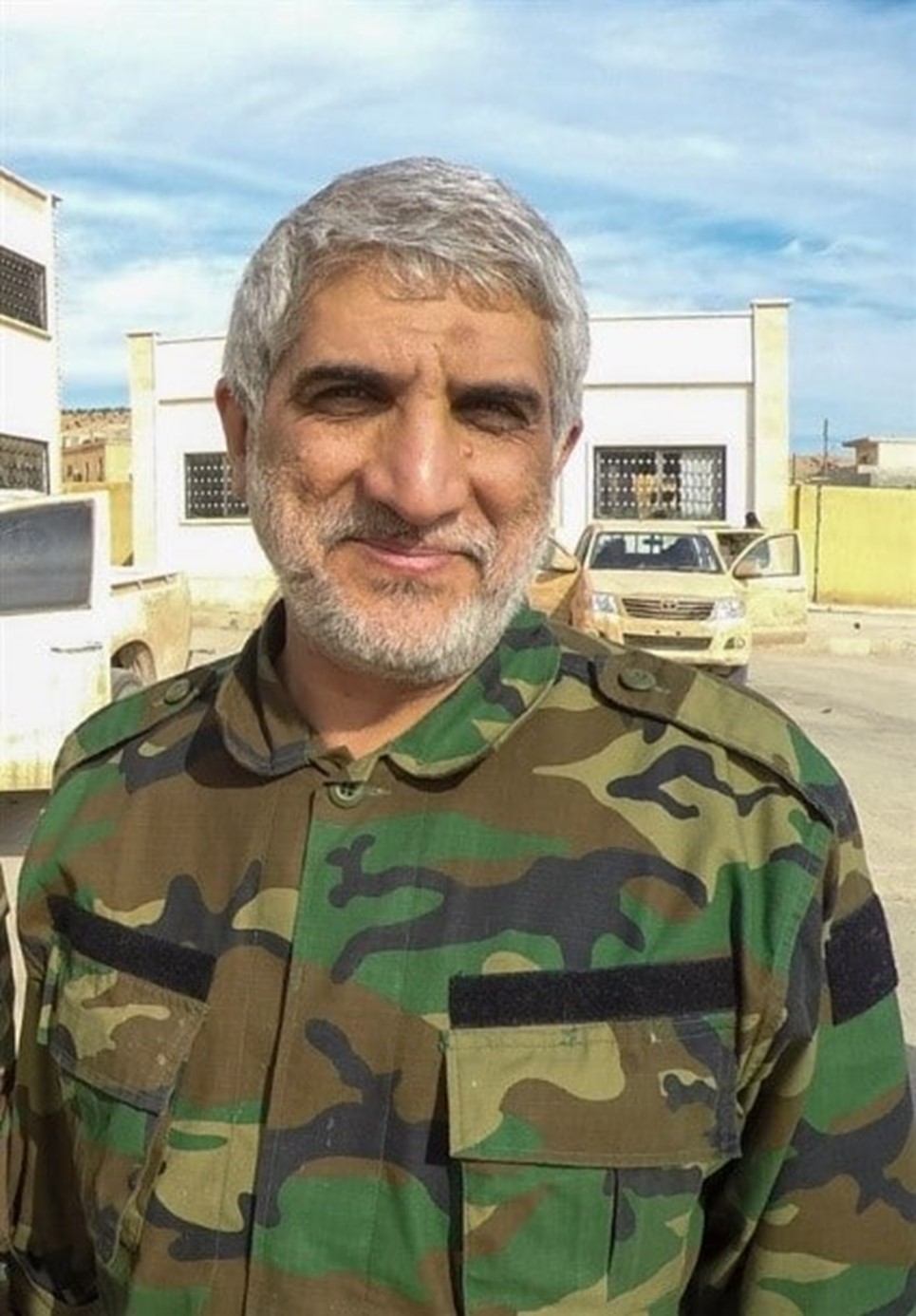
Tasnim News Agency: „This question will surely come up in the minds of the audience. Can it be that a unit can be involved in a war like the one in Syria, and still be able to carry out several other operations simultaneously?”
Gen. Chizari: „The men of jihad are like that, and this characteristic is not unique to Hajj Rahimi. People active in the field of jihad and resistance have this spirit. That is, it’s not that he and people like him sit behind a desk and issue orders. They themselves lead the front, like Hajj Qasem Soleimani, and he always advanced first and brought the rest of the forces after him. The martyr Hajj Rahimi and all the jihad commanders have this spirit, and they take the lead.
„People like the martyr Hajj Rahimi led the missions themselves, since if they wanted to just sit and issue orders, the work would not have gotten done. Hajj Qasem [Soleimani’s] work was ten times harder than Mr. Hajj Rahimi’s, but everybody could feel it. This is why nobody noticed Mr. Hajj Rahimi – his activities and his service could not be felt, particularly by the public, and of course Hajj Qasem was able to do greater things thanks to the presence of great commanders like the martyr Hajj Rahimi.
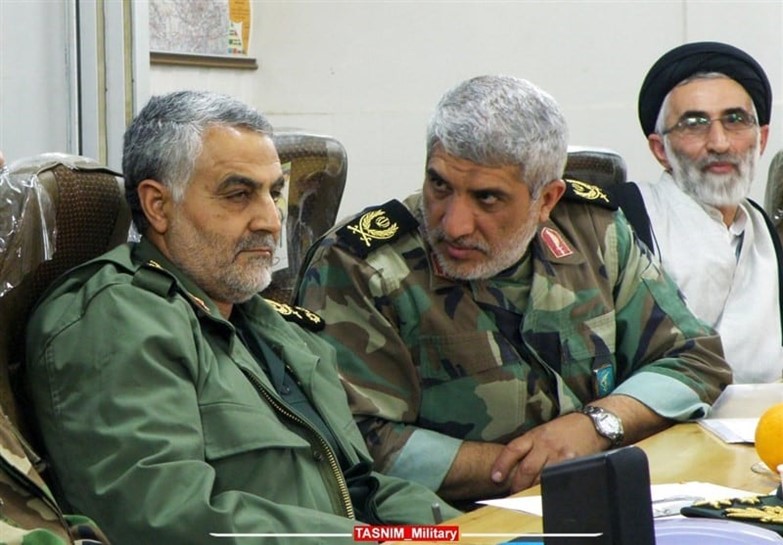
„Even today, if we look at the details of the activity of Hajj Qasem [Soleimani], we can see tasks that were [carried out] by dozens of people like Mr. Hajj Rahimi. Hajj Rahimi was a person who did not know what time was, and he sacrificed all his personal interests for the sake of the organizational interests, the resistance, and jihad. Those who look at things from a materialistic view certainly cannot do such things – people like that only want their day to turn into night, and they ask for overtime pay. But a jihadi powerhouse like Hajj Rahimi is busy getting the job done and does not even notice the passage of time. He loves when time passes more slowly, so that he can get more done. So when they approach the mission with such a spirit, even God brings down His blessings. Great acts are the result of the works of great people, and God grants success to those who have a big personality and honest outlook. God grants them the success to do great things, and He helps them succeed in their work.
„Occasionally, in addition to all the training and operational missions, the martyr Hajj Rahimi would send teams out of Iran in order to train the resistance forces, while at the same time he hosted and trained foreign force in Iran. Indeed, conditions were such that these forces were from different nations, so they did not need to see each other. This matter required independent and separate management, along with proper planning and execution. This was done by the martyr Hajj Rahimi and the Imam Ali special forces unit. As a result of these efforts, Iran and the IRGC are today the kingpin of the resistance front, and all the resistance forces rely on them.
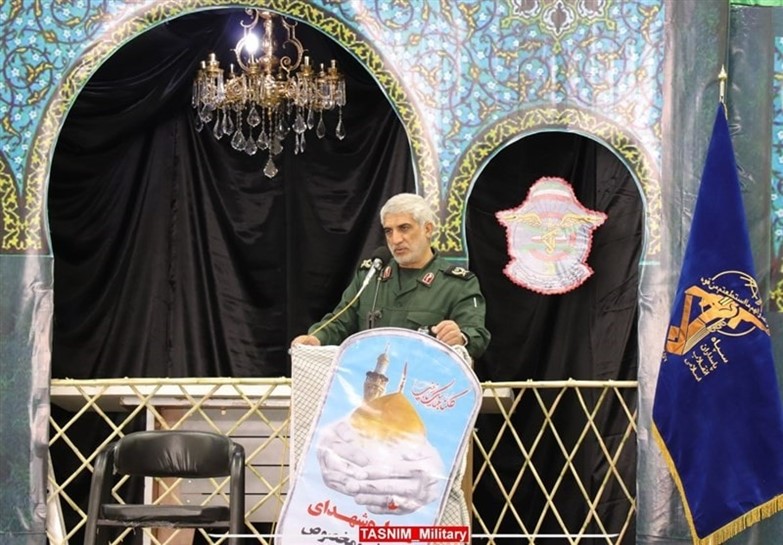
„Along with these training programs, his forces were also the tip of the spear during the war and the various operations, and they also were injured and became martyrs. This created a double mission for the unit and its commander – that is, Hajj Rahimi – and all his colleagues who worked with him…
„Hajj Rahimi’s organization was a jihadi organization, meaning that it is flexible and ready for any mission. At every phase, improvised and unexpected missions took place on the basis of the existing conditions and flexibility in the resistance axis, and the execution of these missions was under the responsibility of Hajj Rahimi’s unit. The Imam Ali special forces unit was not a classical unit, and when his unit would suddenly receive a mission, Hajj Rahimi paid special attention to receiving it and executing it, and he led the unit and the forces under his command in fulfilling it.
„This is the characteristic differentiating such units from many other organizations. This was one of the peaks of the command of Hajj Rahimi. Accepting the mission and the responsibility were among his prominent characteristics before he was martyred… He was the deputy [commander] of the Qods Force academy, and after a few years he left it and was a unit commander. But when they told him to go back to the academy, he agreed and went back…
„In recent discussions, he wanted to finally be in a place where he could be more productive and useful, so he left [Iran]. On the eve of [Nowruz], several days before he was supposed to leave, he was offered to be the deputy [commander of Qods Force] in Syria and to fulfil his role there. He knew that this would be a very difficult responsibility and not similar to the structure and organization here [in Iran], but he chose to go there. Even though it was easier for him here, and his status in the organization was higher and he had a reputation here, he went through all this with ease and accepted what he thought would please God. He made a deal with God, and God answered him [by making him a martyr].”
„The Honorable [Khamenei] Is Commander Of The Resistance Axis, And He Alone Directs, Leads, And Commands It”
Tasnim News Agency: „You said he has much credit among the resistance front, in that he prepared and trained the resistance front forces.”
Gen. Chizari: „Of course he does. But there may be many others like him who have remained anonymous despite their great contribution and their bloodshed and hardships. His martyrdom, and how it was reflected in the resistance front, shows that he has important status. It is also a result of his performance… His role, as is well known, and his contribution to the resistance front are very great, and their impact and results are considerable and ongoing.
„The honorable [Khamenei] is commander of the resistance axis, and he alone directs, leads, and commands it. At one point, the command in the area was in the hands of Hajj Qassem [Soleimani], who worked under Khamenei. Under this command, other commanders successfully advanced the resistance front to a certain place, the result of which was Operation Al-Aqsa Flood [on October 7, 2023].
„The groups that are operating in Yemen [i.e. the Houthis] and in other places are a result of the work of people like Hajj Rahimi over the past decades. This work is now bearing fruit and is growing exponentially from day to day. Operation Al-Aqsa Flood was the result of many years of training and support by jihad forces, and the outcome is that today, all the people of the world are rising up against the Zionist regime, and the nature of the Zionist regime is being revealed to the whole world.
„The American students [protesting on university campuses throughout the United States] do not belong to the regular sector of society. But today there is enlightenment among students at the university level worldwide. They have realized that on one side is the oppression being perpetrated by Israel, and on the other side are the oppressed and deprived Palestinian people.”
„Exporting The Revolution Is Nothing More Than Exporting The Culture Of Resistance”; „Today This Culture Has Spread Throughout The World And Everyone Realizes That They Can Stand Up To The Superpowers”
„Only now, after 40 years of bloodshed and hardship, do the American students understand what is happening. The honorable [Khamenei] gave practical expression to the ideals of the Imam [Khomeini] by establishing the Qods Force, organizing the resistance axis, and building it up inside and outside [Iran’s] borders. If we follow this command, the outcomes of the resistance axis will spark resistance in Muslim and non-Muslim countries. Today, the resistance is not unique to the Islamic countries. The resistance has also infiltrated non-Islamic countries, and concepts such as opposition to the arrogance [i.e. the U.S.] and to oppression, along with the concept of independence, have become widespread.
„Exporting the revolution is nothing more than exporting the culture of resistance. Today, this culture has spread throughout the world, and everyone realizes that they can stand up to the superpowers. Everyone wants independence, and they know who the usurper is [i.e. Israel], who is arrogant [i.e. the United States], and who is oppressed [i.e. the Palestinian people]. They know who is right [i.e. Iran and the resistance axis] and who is wrong [i.e. the West], and we see who is right [i.e. Hamas and the Palestinian Islamic Jihad] and wrong [i.e. the Palestinian Authority] among the Muslim people of Palestine.

Hajj Rahimi with current IRGC Qods Force commander Esmail Qaani. Source: Tasnim News Agency (Iran), May 12, 2024.”The Muslim people of Palestine are all Sunnis, and had no connection to Iran. How was this connection found? Once, they were followers of Egypt, Saudi Arabia, and so on – [countries] that pretended to support Palestine. So how is it that today the Shi’ites come to the battlefield and actually support the Palestinian people?!”
Tasnim News Agency: „When Hajj Rahimi became Qods Force deputy commander for coordination, did his behavior change?”
Gen. Chizari: „Not at all. He was a heroic and honest man, and maintained a close relationship with the lower ranks… Actually, when he became the deputy commander for coordination, he was much more relaxed and humble than before. Before that, he might have argued more in work discussions. But overall, these things did not mean much to him.
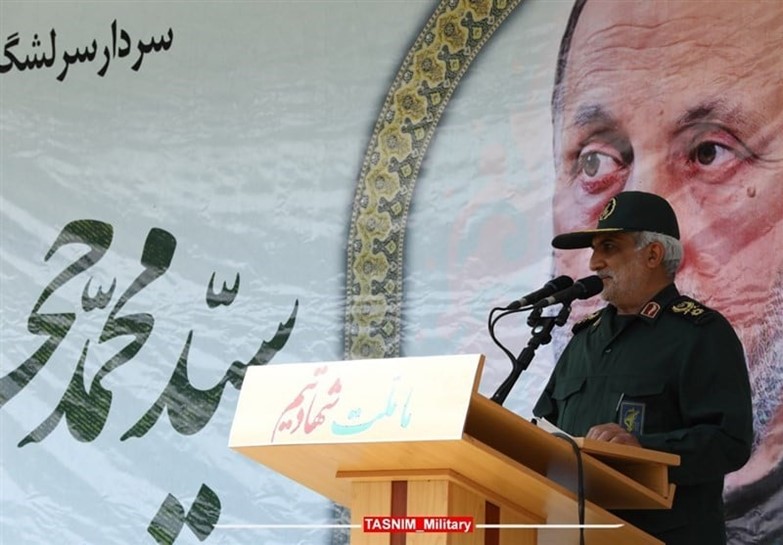
Hajj Rahimi at the ceremony at which he was appointed Qods Force deputy commander for coordination. Source: Tasnim News Agency (Iran), May 12, 2024.Tasnim News Agency: „How did you find out that he was martyred?”
Gen. Chizari: „I was here, and they told me that Israel had carried out an attack in Damascus. The minute they informed me that the building had been hit, I assumed something had happened to him because I knew he had gone to that building. Right after that, I called, and they informed me that he had been martyred.”[1]
[1] Tasnim News Agency (Iran), May 12, 2024.








